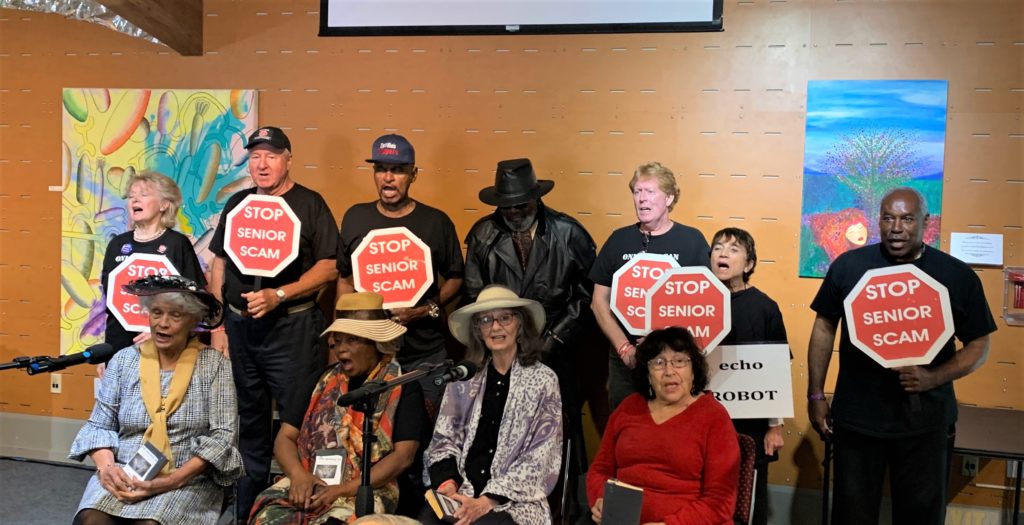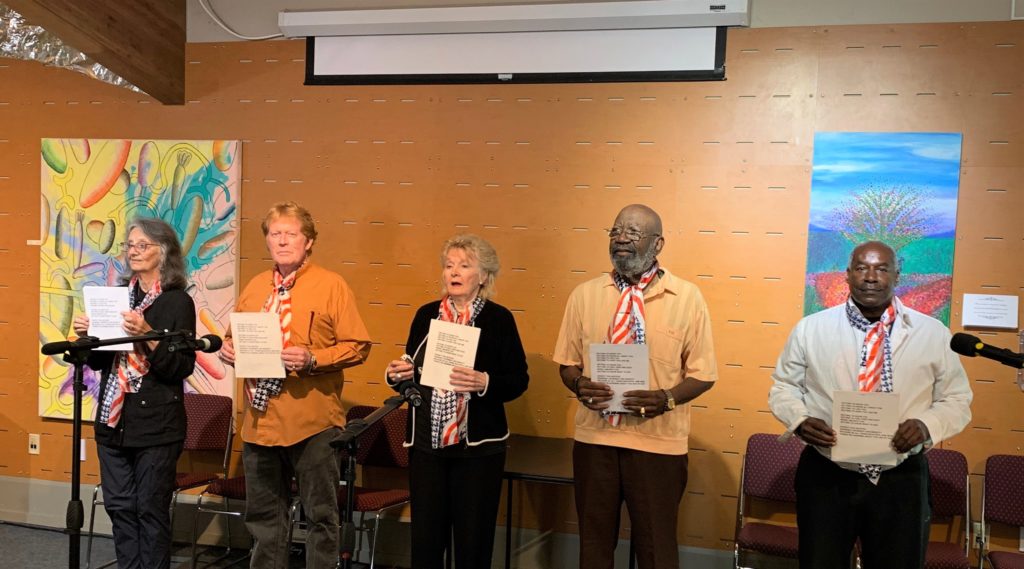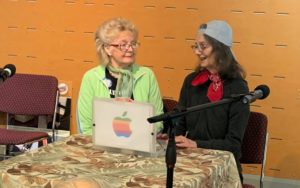
Members of the Stop Senior Scams Acting Program appeared at the Palisades Library. The group did skits about the different scams that are currently used against seniors.
Largely Unreported Because of Embarrassment
The most recent crime report from Palisades Senior Lead Officer Michael Moore reported a senior had lost more than $23,000 in bitcoin from a person he/she thought was a grandchild.
What’s different about this senior scam from others? Was it the bitcoin or was it the scammer posing as a grandchild?
Neither. This scam was reported to the police. Many are not.
Anyone can be a victim of a scammer. Many seniors do not report crimes.
This was the message presented over and over again on July 22 at the Senior Alliance meeting at the Palisades Library.
Members of the Stop Senior Scams Acting Program presented skits that highlighted some of the more popular current scams.
WINNING A CONTEST ONE DIDN’T ENTER:
“It says I’ve just won a million dollars,” one actor proclaimed. “I’m going to take my family on a trip and pay for my grandson’s college education.”
A second actor told her to look at the fine print, which said that in order to claim the prize, the person first had to send $600.
Do people actually send money to a contest they never entered? Yes. As one actor pointed out, “If you have to pay for it, it’s not a prize.”
Tip: You have to be careful of the people who scam you to get your money.
INTERNET DATING:
In this sketch, one woman shares a photo. “Is that your grandchild?” the second one asks.
“No, that’s my boyfriend,” the woman said. “You should see the letters he’s written me.
“He’s a computer programmer and he just lost his job. I sent him a little money to tide him over,” the woman said. “I helped with a few bills.”
The woman’s friend discovers the man’s photo is a stock photo and tells her friend that the “new boyfriend” is most likely a con artist.
“I feel so stupid,” the woman said.
“Don’t feel so bad, just call and report it,” the friend advises.
“I can’t. I’m too embarrassed,” the woman said.
Tip: Many seniors are lonely and are looking for love. They are easily preyed upon and some have even lost their homes to con artists. Do not be fooled by someone on the internet. People are not always who they say they are.
MEDICARE/DNA:
This is one of the more recent scams. A provider shows up at a local church, library or senior center, or calls a senior on the phone and offers free DNA/genetic testing to Medicare beneficiaries.
Medicare only pays for tests prescribed by doctors. The people running this scam are just trying to collect Medicare numbers.
In the wrong hands a senior’s Medicare number could be used to commit Medicare fraud and abuse.
Seniors are reminded to review Medicare statements: looking for charges for something you didn’t get; billing for the same services or supplies twice; and for services that were not ordered by a doctor. (For more information about healthcare fraud visit: cahealthadvocates.org)
Tip: If it sounds too good to be true, it probably is not true.
OBITUARY:
A scammer may have read the obituary of a wife/husband and then with a simple search on the internet, finds an address. They stop by the widow/widower’s house to commiserate the loss. The scammer may claim to have been in one or more of the same organizations that the deceased was in, such as a garden club, opera guild or other charitable organization.
Once the widower lets down his/her guard, and because they’re lonely, the scammer can move in (literally or figuratively) and eventually bilk the senior out of money and property.
Tip: Elder abuse is difficult to stop because it is unreported. Last year about five million cases of financial abuse were reported – and it is felt that only one in 25 cases are reported.
SOCIAL SECURITY/IRS SCAM:
“Hello, this is Officer Jackson with Social Security,” said an actor pretending to be a scammer. “This phone call is being recorded. There has been fraudulent activity on your account and your social security card will be cancelled.”
An actor responded, “Officer Jackson, what’s your badge number? Put your supervisor on the phone.”
When the scammer hung up, the actor said, “Tomorrow I’ll go to the Social Security office to see if there’s a problem.”
The same scenario has been used before, but with the scammer pretending to be from the IRS.
Tip: Just hang up. Do not give people money or personal information over the phone.
YOU HIT MY CAR:
In this scam, a person will follow a senior out of a mall parking area, a gas station, a parking lot and wave for them to pull over, claiming the senior hit his/her car.
“I don’t think I hit anyone,” the actress said.
“Look at the dent in my door,” the actor responded. “Your insurance will go up and the DMV is taking away senior licenses. I think the dent will cost about $500 to fix, if you want to settle here.”
“Okay,” the actress said. “I’ll just call the police and we can take it from there.”
Tip: Scammers may stage a car accident, but seniors should not settle with cash, no matter what the other person says.
GRANDPARENTS:
There are variations on this scam, but generally ends with a desperate plea for money
“I got your granddaughter here, and if you want her back home, you’ll do what I say,” the scammer said.
“Help me, Grandma,” another scammer shouts in the background.
“What’s our code word?” the grandma asks. When the scammer doesn’t reply, then the grandma knows it’s a scam.
Always check with your family before you send money for kidnapping, bail or any other hard-luck stories from a purported family member. Having a code word for a family is a good idea.
Tip: Do not send money until you have all the information.

The acting group told seniors to report scams even if they felt embarrassed that they had been conned.
The audience learned that scammers make a good living from the schemes. One man, who is now in jail, said he could make about $10,000 a day.
Bravely, the 14 seniors who presented the skits, all acknowledged that they had been scammed at one time, and the scams centered around different areas such as, the IRS, internet, “You hit my car,” Hollywood agent, cosmetics, vitamins, Social Security, credit card, postal and a bank.
“People are too scared/embarrassed to report scams,” the actors said.
“One of our members got the Social Security scam call while we were rehearsing that sketch,” another actor said.
“You may be a target, but you don’t have to be a victim,” was the message that the actors relayed.
Report scams to the Federal Trade Commission (877) 382-4357 or online ftccomplaintassistant.gov/#crt&panel1-1. Or report to Palisades Senior Lead Officer Michael Moore (310) 444-0737. For Medicare fraud call: (855) 613-7080 or visit: cahealthadvocates.org.


Thanks Sue! I already got a Social Security scam call 2 weeks ago on my cell-tho it was pretty obvious. I no longer pick up either my landline or my cell until I see the incoming number especially the area code. Have memorized all personal friends and family numbers, including cell numbers. But am still wary!!!!
Great program!
As Seniors we need to be especially vigilant for these ever-increasing array of scams targeted at us. I recently have been receiving an obvious robo-call EVERY OTHER DAY, likely trying to con me…I know it’s a fake robo call because the gal is speaking in CHINESE (which I don’t understand) and she NEVER leaves a message on my voice-mail!
I’m following the actors’ advice – “Just hang up”.
Thank You Sue for covering our program. You outlined the scams we presented
excellently. I want to comment on what your reader Phyliss wrote . Unfortunately memorizing friends and family members numbers does not always work.
Unfortunately the scammers sometimes use your own number when they call to trick the attended victim. . This has happened to me personally several times. I also want to clarify what was presented in the Virtual Kidnapping Scam. There is no case where a victim should send money. The local law enforcement agency should be called. I have heard first hand from seniors who have sent money for this scam. Be Aware!
Thank You for bringing these scams to the attention of your readers.
Adrienne Omansky, Director-Founder, Stop Senior Scams Acting Program
Thank You Ron Just Hang Up is the right Thing To Do